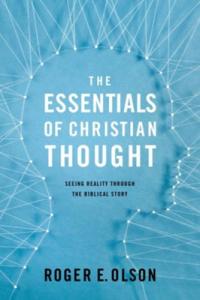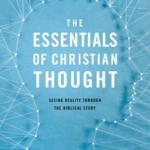Essentials of Christian Thought: Chapter 5: The Biblical-Christian View of Ultimate Reality: God
*Note: I apologize for skipping over chapters 5 and 6. I’m now backing up to chapter 5. I hope to cover chapter 6 on Monday (January 29).*
Personally, I am finding discussing my own writing challenging. Do I critique what I wrote? It wasn’t long ago that I wrote this book. I don’t think I’ve changed my mind about anything. But could I have said something better? Possibly, but others might say yes. I don’t really like reading books, book chapters, article that I wrote. And there’s lots of that. My book The Story of Christian Theology (InterVarsity Press) has sold over forty thousand copies including some in Chinese in the People’s Republic of China. My book (co-written with Stanley Grenz) Who Needs Theology? (InterVarsity Press) is in its 29th printing. Last I heard it had sold over fifty thousand copies. But for whatever reason reading things I wrote feels a bit like grinding fingernails on a chalkboard. So going back through this book is difficult for me but not for any particular reason. I think it must have something to do with how many times I had to read it in various forms before it was finally published. But I don’t really know why.
So on to chapter 5: The Biblical-Christian View of Ultimate Reality.
I suspect what will stir up the most controversy about this chapter, among Christian readers, is my assertion that the God of the Bible is not Being Itself but “a being.” I go out of my way, to great lengths, however, to emphasize God’s transcendence, but without losing God’s particular personhood.
I am not aware of being influenced by a somewhat “liberal” school of American theology called “Boston Personalism” (Bowne, Brightman, Bertocci) and I would not say that God is “finite,” but I have long objected to describing God as infinite because that seems speculative to me. “Infinite” can be interpreted as impersonal. Certainly German philosopher Fichte made that argument and Kant and Hegel didn’t do much to helpfully counter his argument.
In this chapter I explain what I believe, along with my “guides” Cherbonnier, Tresmontant, Brunner, Herschel and others, about God’s attributes. I believe the Bible portrays God as temporal, not a-temporal. I believe that the Bible portrays God as vulnerable, not impassible. I believe that knowledge of God involves the “heart” and not only the mind. Knowledge of God and ethics are inseparable.
In Interlude 5 I discuss God’s self-limitations. I recommend that, if possible, Christian doubters (about God’s self-limitations) read well-known and extremely influential Baptist theologian Augustus Hopkins Strong’s essay “God’s Self-Limitations.” (Strong’s Systematic Theology was a standard systematic theology textbook in especially Baptist seminaries for about a century.) I argue that evil is the absence of the good (not a thing or substance) and that its existence as a privation (as dark exists as a privation of light) is a result of God’s self-limitation to allow a relative autonomy to creatures with genuine non-compatibilist free will (power of contrary choice).
The upshot is that I think a lot of Christian theology over the centuries has involved speculation drawing on philosophy and just plain guesswork, departing from the biblical portrayal of God, from true biblical metaphysics in which the world is ruled, not controlled, by a personal, supernatural creator who is in many ways anthropomorphic (or I might say human beings are partially like God). I could appeal to German theologian Eberhard Juengel for support (God as the Mystery of the World), but that would probably not help most American readers who are not informed about modern/contemporary German theology. Juengel was not afraid to say that God is anthropomorphic. American theologian Clark Pinnock thought about God along the same lines.
*Note: If you have read the chapter and the interlude, feel free to comment and/or ask a question. If you have not read the chapter or the interlude, only ask, don’t comment. In every case, if you post a comment or question or both, keep it relatively brief (no more than 100 words), on topic, addressed to me, civil and respectful, not hostile or argumentative, and devoid of pictures or links.*














